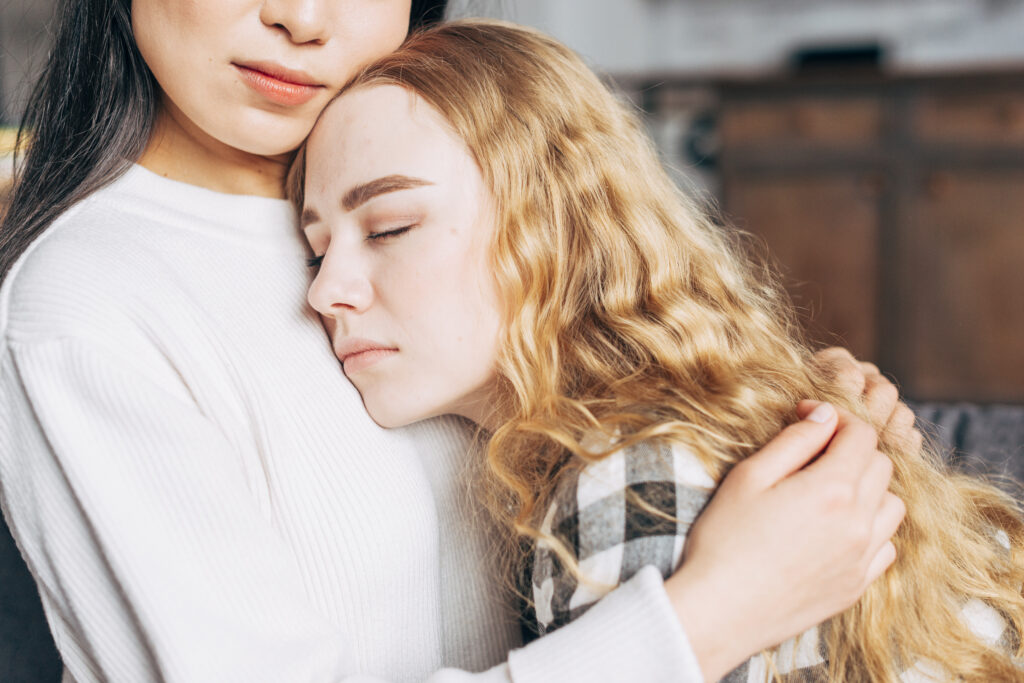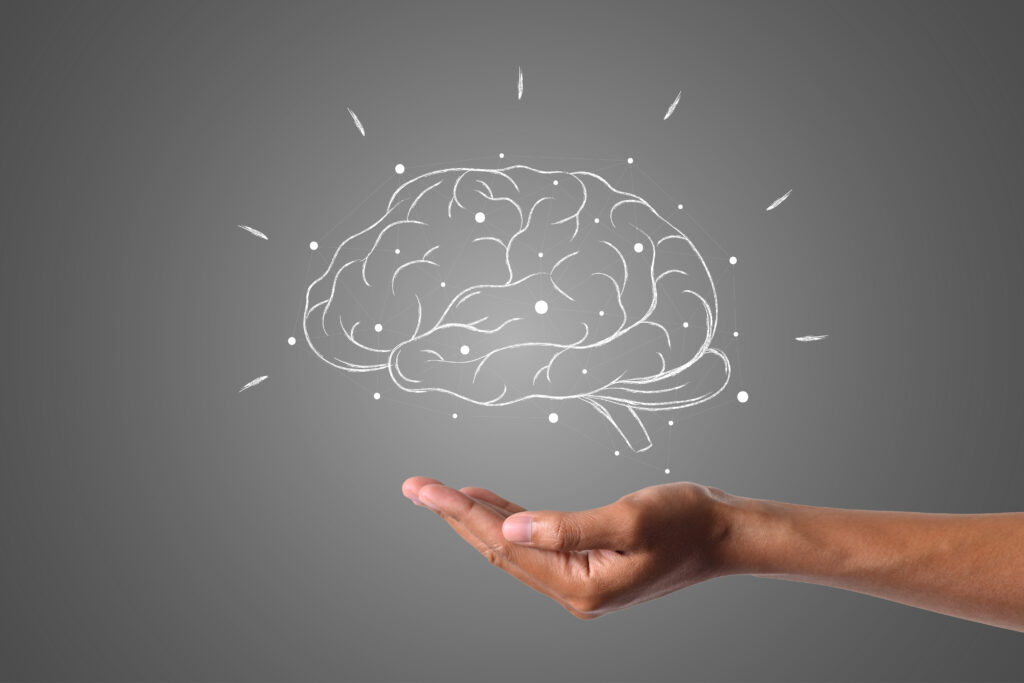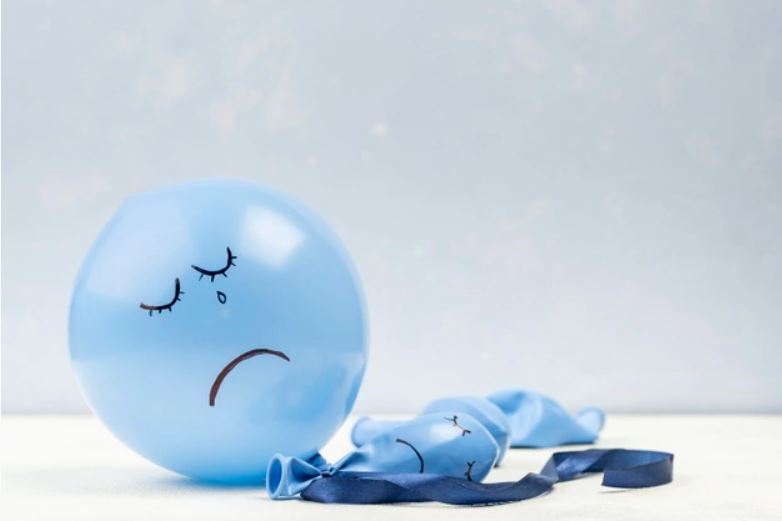Loving Someone With Depression – What You Need To Know

Is someone you love struggling with depression? While they are the ones battling the illness, it must be hard for you as well. It is an illness that easily wraps you up in its darkness, even if you’re just the bystander. You may get caught up in feeling worried, scared and overwhelmed with the intensity of emotions that the person you love is experiencing. Naturally, you want to give them all your support, but maybe you don’t really know how… Like you just can’t find the perfect words or do the right thing.
Depression is a serious and complex illness, and even though most people know about it, it is still often underestimated, misunderstood and simplified. By learning more about it, you would be able to support your loved one, but also help yourself to handle the situation better.
Here are some of the things you should know.
Depression is not like regular sadness

How would you define the word “depression”? If you’re like most people, you would probably say something like “an intense sadness”. And you would be partially right – sadness is definitely a symptom of depression, but being depressed is actually so much more than being sad.
Sadness is an emotion. Feeling sad is how you react to situations that make you upset. Everyone feels down once in a while, and it’s completely normal to be sad from time to time like when you fail an important exam, lose a job, have a fight with your friend. You may feel sad for some period of time, but the best thing about sadness is – it goes away. Maybe someone comfored you, maybe you found a solution to the situation, maybe it was simply the time that healed you.
But depression is not an emotion. It is an illness that affects your mood, and you can’t just wait for it to go away. The sadness that comes with depression is constant, and not occasional. Sometimes a person may feel like they don’t even have a specific reason to feel that way, but they still do.
Another reason that makes it different from regular sadness is that it makes it hard for a person to function in their everyday life. Maybe you noticed some of those symptoms in your loved one. Are they barely eating, or suddenly eating too much? Do they keep tossing and turning at night, or they sleep throughout the whole night, but don’t wake up before noon? Or they talk slowly and move slowly, like they have 0 energy?
These are all common symptoms that depressed people may experience. Other symptoms may include difficulty concentrating, feelings of deep, unwarranted guilt, fatigue, physical symptoms (like headaches or stomach aches), thinking and talking about death, weight issues, irritability or anger and lack of self care (physical hygiene, tidy clothes, cleaning around the house).
All of this makes it hard to live day to day, and it impacts a person’s life more than regular sadness ever could. In your loved ones mind, it can feel like it’s never ending. Treating it as regular sadness can make it even harder for them to hope, because they might feel like they are overreacting or like they’re weak because they can’t fight off that feeling. Asking them to describe that feeling to you, and telling them that you’ll do your best to understand could take at least a little bit of weight off their shoulders.
Depression is not something they can control

Was there a time when you just got frustrated with your loved one and their consistent bad mood? Maybe you thought (or even told them) they should simply just snap out of it! Maybe you thought they were being overly dramatic or overreacting, or like they weren’t trying hard enough and just kept feeling sorry for themselves.
It’s normal to think like that sometimes when you don’t know much about depression. But when you learn about the causes of that illness, you can have a better understanding of it and realize dealing with the symptoms is out of the person’s control and why they can’t just “snap out of it”.
You have probably heard about the “happy hormones”, scientifically known as serotonin, dopamine and oxytocin. These little chemicals in your brain have lots of different roles that keep you feeling good: emotional processing, mood, appetite, sexual desire and performance, sleep and pain processing. Naturally, in order for your mood to function normally, these chemicals need to be functioning as well. But in depressed people, there is often an imbalance of these chemicals.
There are a few ways in which this imbalance can happen: the brain is making too much or too little of those hormones, there aren’t enough molecules that make these hormones or these hormones can’t reach important brain regions.
Besides chemicals, scientists tried to find brain regions responsible for depression. It can be caused when some of the parts of your brain don’t get enough blood flow, if there is some damage to those parts, if your brain volume is decreased or if those structures in your brain are smaller than usual.
Genes also play a role. If a person has someone in their family, like a parent or a sibling, who suffers from depression, that person probably has a 2 or 3 times greater risk of developing the illness.
And also, there are studies that show even microbiomes from your gut can affect the way you think and make you prone to depressive mood!
So: brain chemicals, brain structures, genes, even gut microbes… These are not the things that are easily controlled. Your loved one is trying to fight against their own brain and body that are making them feel the way they feel. They hate that fight as much as you hate seeing them like that. The best you can do to help them win is to understand the biology beneath that fight.
Depression is not their personality

When you think back to when you met your loved one for the first time, do you feel like they were someone completely different than how they seem now? Were they full of life and interests? Or they used to be fun and creative?
But now, all they want to do is stay in bed all day. It seems like everything you liked about them, everything you thought made them unique, disappeared and it’s like someone new is in front of you, someone you don’t really like as much. You may think they changed, or that they were just pretending to be better than this. But, that’s actually not true.
Another common symptom of depression is something called anhedonia. Anhedonia is defined as the inability to enjoy experiences or activities that a person would normally find pleasurable. If your loved one is dealing with depression and they seem to have lost all the joy, they are most likely battling this symptom.
This can manifest in many different ways: maybe they used to adore reading book after book, but now they can’t get themselves to read a single chapter. Maybe they enjoyed jogging in the morning, but now they don’t even want to wake up before noon, let alone go for a run. Maybe they used to be excited for a night out, partying and dancing, but now they make up excuses just so they wouldn’t have to go.
From the perspective of a depressed person, this symptom is very real, and it’s heartbreaking. It is not hard enough to be constantly feeling down and hopeless, but this specific symptom makes a person feel they lost themselves somewhere along the sadness. They wish they could just go back to things they liked and enjoy doing some activity, any activity for that matter, but no matter how hard they try, they just can’t make themselves feel excited for it.
But what is important to remember is – that doesn’t mean they are someone different now. They may have depression, but it’s no who they are. Depression is a mood disorder, and not a personality trait. Somewhere below the messed up chemistry, they are still fun, happy and loving just as they used to be before they got ill. And once they find the strength to recover, they will find their way to their old self again.
Setbacks are a part of recovery

Was there a time when your loved one went through some really good days? Maybe they were going to therapy or started medication, or maybe they managed to lift themselves up through self recovery. You thought to yourself “finally, they are cured and no longer depressed!” But then after some time, the symptoms started creeping in again and all of a sudden you were both back at the start. When someone you love seemingly gets better and then worse again, it can leave you feeling a bit confused, but also kind of scared. You may worry they may never recover for real, and you are uncertain of the future that awaits you, will you ever be able not to worry about their depression?
The truth is, unfortunately, while recovering from depression, relapses are not only possible, but also probable.
You might think about depression as a linear illness that has its beginning and end. Like, let’s say, chickenpox. You get the illness, you are sick for some time, you cure it, and you never get it again. But depression is more like a flu. With flu, you catch it when you’re near a virus (that acts as a trigger for the flu), and while you do get better, you could get it again next winter if you happen to catch the virus again. Like flu, depression has its triggers (only it’s much more complex than simply catching a virus), and if you’re triggered, you can become depressed again. This is called depressive episodes.
Let’s give an example. Imagine a person who is getting bullied in school. Bullying is one of the triggers for their depression. After highschool, they decide to visit a psychiatrist who makes a diagnosis of a depressive episode. They go through intensive therapy and after some time, they get better and enter recovery. But then, after a few years, they lose their job and break up with their partner. The breakup and job loss act as a new trigger, and their depression gets back. This time, they are experiencing their second depressive episode, and their psychiatrist will diagnose them with a recurrent depressive disorder, meaning this is not their first time to experience depression.
According to the American Psychiatric Association, at least 50% of those who recover from a first episode of depression will suffer from one or more additional episodes in their lifetime, and approximately 80% of those with a history of two episodes will have another recurrence. It has also been shown that on average, individuals with a history of depression will have five to nine separate depressive episodes in their lifetime.
If this information seems discouraging, it really doesn’t have to be. Even if it’s a recurring illness, recovery is still possible, and the coping mechanisms that a person learns through therapy can be of great help to make each following episode easier to handle. And also, if you think your loved one is incurable or doomed for a lifetime of depression, think about this: do you think someone is incurable if they get a flu each winter season? Probably not, so don’t worry the next time winter comes.
You can not cure their depression

I understand you want to help your loved one. You want them to be happy, and their happiness is your happiness too. You hate seeing them suffer, so you try whatever it takes to make them feel better. You might offer advice, listen to them, inform yourself about depression, try and motivate them to do activities with you… Maybe all those things are helpful for them in the moment, and it is so nice of you to try and help, but do you think it’s working in the long run?
Chances are, it’s not. And that’s not because you’re failing to help them, or because you’re not good enough to help them. As with any illness, mental or not, it requires medical attention.
A mental health professional is there to diagnose and treat your loved one’s depression. They are trained to perform different kinds of therapy that focus on changing negative thinking that stems from depression. Also, oftentimes the treatment requires medication. Even though there is still a social stigma present surrounding medication for mental illness, antidepressants can be extremely useful in combating physical symptoms like the lack of energy and decreased motivation. It can give the person much needed boost so they can physically dedicate their time and effort into getting better. The treatment takes time, it is not an easy job, but getting professional help is the best choice a person can make for their wellbeing.
Because of all that, you should never feel guilty of not being able to cure your loved one’s depression. You can be there for them on their journey with hugs and patience and words of encouragement, but their therapist and, of course, themselves, are here to do the actual job.
And another thing that you can do to help them while they’re getting professional help, is to take care of yourself. Dealing with all this can be draining. Give yourself time to take care of your own needs, and allow yourself to take a break if you feel you need to. You deserve it just as much as they do.

No matter how hard it is for both of you, always remember that you have each other, and that you love each other. Even if recovery is a bumpy road that takes time and dedication, they can make it with you by their side!
You might not always have the right words, but you can never go wrong with “I’m here for you”. Those words, followed by a strong, honest and loving hug, could be their one shining star in the dark sky.
Thank you for reading!
Written by: Stela Košić
If you wish to find out more about topics on depression, feel free to check out some of the videos from Psych2Go’s YouTube channel:
- 7 Signs Of Depression
- 12 Things About Depression You Need to Know
- 8 Types Of Depression You Should Know
- 9 Warning Signs of Severe Depression
- 6 Things People With Depression Want You to Know (PART 1)
- 5 Things You Should Never Say To Someone With Depression
- 6 Less Obvious Signs of Depression
References:
- Burcusa, S. L., & Iacono, W. G. (2007). Risk for recurrence in depression. Clinical Psychology Review, 27(8), 959–985. https://doi.org/10.1016/j.cpr.2007.02.005
- Conradi, H. J., Ormel, J., & de Jonge, P. (2012). SYMPTOM PROFILES OF DSM-IV-DEFINED REMISSION, RECOVERY, RELAPSE, AND RECURRENCE OF DEPRESSION: THE ROLE OF THE CORE SYMPTOMS. Depression and Anxiety, 29(7), 638–645. https://doi.org/10.1002/da.21960
- Cooper, J. A., Arulpragasam, A. R., & Treadway, M. T. (2018). Anhedonia in depression: biological mechanisms and computational models. Current Opinion in Behavioral Sciences, 22, 128–135. https://doi.org/10.1016/j.cobeha.2018.01.024
- Depression vs. Sadness: When Should You See a Doctor? (2021, July 14). WebMD. https://www.webmd.com/depression/depression-sadness
- Dunlop, B. W., & Nemeroff, C. B. (2007). The Role of Dopamine in the Pathophysiology of Depression. Archives of General Psychiatry, 64(3), 327. https://doi.org/10.1001/archpsyc.64.3.327
- Levinson, D. F., & Nichols, W. E. (n.d.). Major Depression and Genetics. Stanford Medicine. https://med.stanford.edu/depressiongenetics/mddandgenes.html
- Limbana, T., Khan, F., & Eskander, N. (2020). Gut Microbiome and Depression: How Microbes Affect the Way We Think. Cureus. Published. https://doi.org/10.7759/cureus.9966
- M. (2021, October 14). Helping Someone with Depression. HelpGuide.Org. https://www.helpguide.org/articles/depression/helping-someone-with-depression.htm
- Mental Health UK. (2020, June 25). Types of depression. https://mentalhealth-uk.org/help-and-information/conditions/depression/types-of-depression/
- Moreira, F. P., Jansen, K., Cardoso, T. D. A., Mondin, T. C., Vieira, I. S., Magalhães, P. V. D. S., Kapczinski, F., Souza, L. D. D. M., da Silva, R. A., Oses, J. P., & Wiener, C. D. (2019). Metabolic syndrome, depression and anhedonia among young adults. Psychiatry Research, 271, 306–310. https://doi.org/10.1016/j.psychres.2018.08.009
- Pandya, M., Altinay, M., Malone, D. A., & Anand, A. (2012). Where in the Brain Is Depression? Current Psychiatry Reports, 14(6), 634–642. https://doi.org/10.1007/s11920-012-0322-7
- Scantamburlo, G., Hansenne, M., Fuchs, S., Pitchot, W., Maréchal, P., Pequeux, C., Ansseau, M., & Legros, J. (2007). Plasma oxytocin levels and anxiety in patients with major depression. Psychoneuroendocrinology, 32(4), 407–410. https://doi.org/10.1016/j.psyneuen.2007.01.009
- Werner, F. M., & Coveñas, R. (2010). Classical Neurotransmitters and Neuropeptides Involved in Major Depression: a Review. International Journal of Neuroscience, 120(7), 455–470. https://doi.org/10.3109/00207454.2010.483651
- What Is the Chemistry Behind Depression? (2021, January 5). Verywell Mind. https://www.verywellmind.com/the-chemistry-of-depression-1065137#brain-chemicals-and-depression
- Whelan, C. (2017, March 31). Is It Depression or Sadness? Learn the Signs. Healthline. https://www.healthline.com/health/depression/depression-vs-sadness#symptoms




Responses